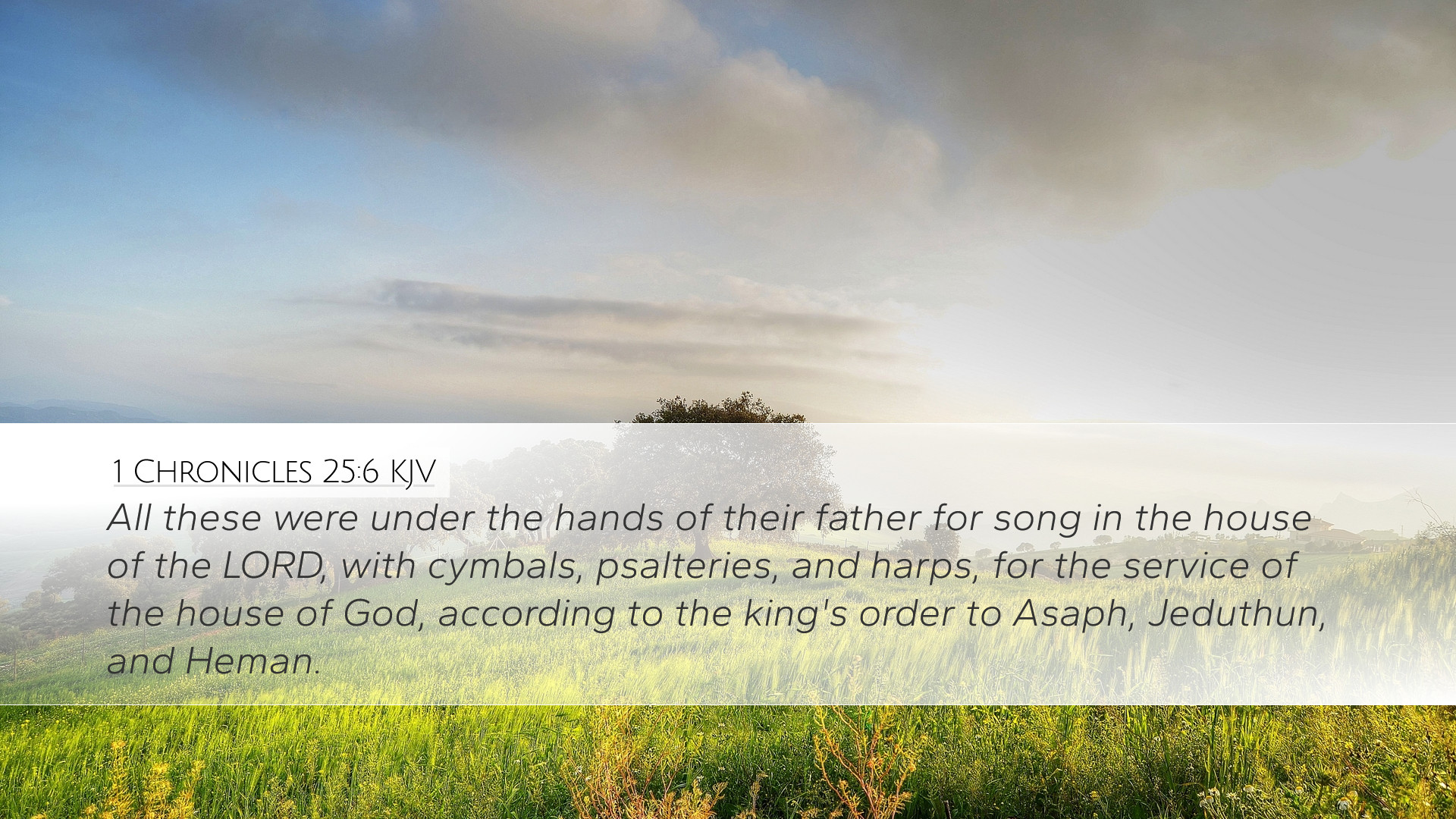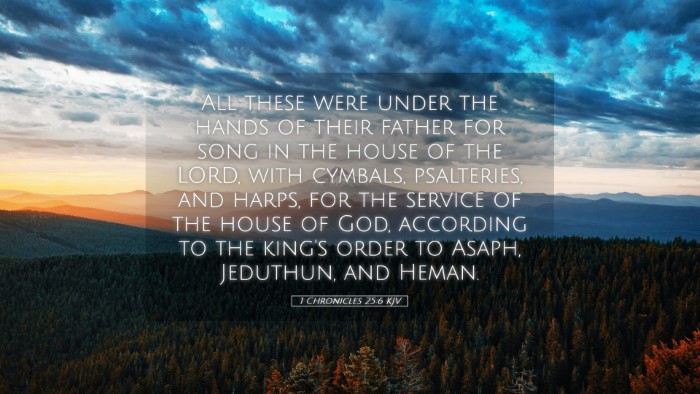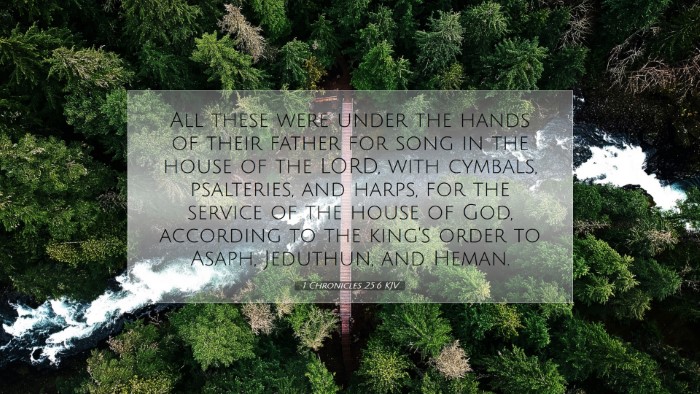Commentary on 1 Chronicles 25:6
Verse (1 Chronicles 25:6): "All these were under the hands of their father for song in the house of the LORD, with cymbals, psalteries, and harps, for the service of the house of God, according to the king's order to Asaph, and to Heman, and to Jeduthun."
Introduction
This verse serves as a critical point in establishing the structure and organization of worship in the temple during the reign of David. It emphasizes the essential roles of the musicians and their instruments in the liturgical practices of Israel. Commentators like Matthew Henry, Albert Barnes, and Adam Clarke provide a rich tapestry of insights into this passage, highlighting its significance for both ancient Israel and contemporary worship.
Contextual Background
The context of 1 Chronicles 25 is found within the broader narrative of David's preparations for the temple. After securing the throne, David's focus shifted toward the establishment of proper worship practices. The mention of Asaph, Heman, and Jeduthun illustrates the organized structure of the Levitical musicians, revealing how seriously David took the worship of Yahweh.
Insights from Matthew Henry
Role of Musicians: Matthew Henry emphasizes that the musicians were not mere entertainers; they were vital in leading worship. Their role was spiritually significant, as they created an environment conducive to divine encounters. Henry points out that music has always been a crucial part of worship, reflecting on its capacity to inspire devotion and reverence.
Family Legacy: He further notes that these musicians were under the authority of their "father," which signifies a continuation of spiritual heritage. This implies that music and worship should be cultivated within families, passing down the values and practices across generations.
Insights from Albert Barnes
Organization of Worship: Albert Barnes emphasizes the systematic organization of sacred music and its significance. He elaborates that this was not a haphazard collection of musicians but a well-ordered group specifically designated for service. The reference to "the king's order" indicates the authority behind this structure, illustrating that worship should be conducted decently and in order (1 Corinthians 14:40).
Instruments of Worship: Barnes also discusses the variety of instruments mentioned: cymbals, psalteries, and harps. Each instrument has its distinct sound and purpose, suggesting that diversity in worship is to be embraced. The use of instruments in worship acknowledges the different ways in which people connect with God and each other.
Insights from Adam Clarke
Divine Inspiration in Music: Adam Clarke highlights the notion that music in worship springs from divine inspiration. He notes that the term "song" indicates that worship is a response to God's revelation, and thus the music used should reflect a heart attuned to Him. Clarke's commentary connects the cosmic order of the universe with the harmonious nature of worship music.
Conclusion: Clarke articulates the idea that the order of singers and musicians represents a microcosm of the celestial order, where everything has a place and purpose in the divine plan. He encourages modern worshippers to consider their participation in music as an alignment with God's cosmic order.
Theological Implications
- Worship as a Collective Experience: The passage underscores the communal nature of worship where individuals come together for a common purpose, highlighting the importance of church community.
- Spiritual Authority: The king's order signifies the need for spiritual authority in worship settings, suggesting that worship should align with divine order and leadership.
- Legacy and Family in Worship: The legacy of faith and worship within families emphasizes the need for teaching and discipleship in the home.
- Diversity of Worship: The array of musical instruments points to the diversity in how worship can be expressed and invites congregations to embrace varied forms of music as legitimate expressions of worship.
Practical Applications for Today's Church
- Embrace Music in Worship: Churches should actively include music in their worship services, recognizing its power to enhance the spiritual atmosphere.
- Encourage Family Participation: Churches should cultivate environments where families can worship together, promoting generational continuity in faith practices.
- Order in Worship Services: Church leaders are encouraged to provide structure and order in worship services to reflect the beauty of God’s design.
- Celebrate Diversity: Encourage the inclusion of diverse musical styles and backgrounds in worship, enriching the worship experience for all congregants.
Conclusion
1 Chronicles 25:6 provides profound insights into the nature of worship during the time of David. The dedication of the musicians reflects a pilgrimage toward a deeper understanding of God’s presence. Through the lens of commentators such as Matthew Henry, Albert Barnes, and Adam Clarke, we grasp the theological and practical implications of this verse. Ultimately, it calls the church today to honor God through structured, diverse, and heartfelt worship, diligently carrying forth the legacy of faith.


